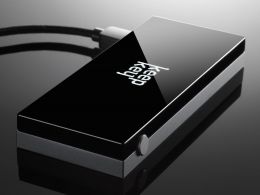
Hardware crypto wallet sales increase as centralized exchanges scramble
Hardware wallet providers are seeing increases in revenue in this bear market as crypto investors withdraw assets off centralized exchanges. Blockchain analysis firm Glassnode recently characterized the 2022 bear market as the worst on record. This seems to be the case due to events such as the war in Ukraine and rising inflation, coupled with serious problems among centralized crypto exchanges. Yet, the bear market hasn’t negatively impacted all players in the crypto ecosystem. Hardware wallet providers seem to be benefiting from the massive amount of crypto withdrawals from centralized....
Related News
Global crypto exchange revenue is estimated to grow at a 13% CAGR by 2028, while the hardware wallet market is expected to exhibit a CAGR of 27% by 2027. The crypto hardware wallet industry could be growing at a faster pace than cryptocurrency exchanges, data from several studies suggest.The current bear market has accelerated the development of the cold wallet industry, while many centralized crypto exchanges were scrambling to maintain operations. According to a report by business intelligence firm Vantage Market Research, the revenue of global crypto trading platforms amounted to $330....
Bitcoinist spoke with KeepKey CEO Darin Stanchfield on what makes this hardware wallet different from the Trezor; why sales are increasing in India; and how hardware wallets can boost security for both users and exchanges. ‘Large Uptick’ in Sales to India, CEO says. Bitcoinist: KeepKey costs $99. Why should Bitcoin users store their funds with the KeepKey hardware wallet instead of a piece of paper that costs zero? Darin Stanchfield (DS): Paper wallets are a great way to secure your digital assets with two big caveats: First, you need to generate the paper wallet securely. This means....
The hardware wallet firm is certain that the latest uptick in demand is a result of investors rescuing their funds in the aftermath of the FTX failure. Amid growing concerns over centralized cryptocurrency exchanges in the wake of the FTX crisis, investors are increasingly moving to hardware crypto wallets.A major hardware wallet provider, Trezor, has recorded a major uptick in wallet sales in the aftermath of the FTX contagion, the firm’s brand ambassador Josef Tetek told Cointelegraph on Nov. 15.Trezor saw its sales revenue surging 300% week-on-week and it’s still growing, Tetek....
Bitcoin hardware wallet manufacturer KeepKey has just announced its global sales expansion. The company has partnered with trusted retailers to allow local distribution of their flagship cold storage product in 11 countries across the globe. KeepKey Teams Up With Global Retailers. The KeepKey hardware wallet has become a popular device among....
KeepKey, the cryptocurrency hardware wallet company has partnered with ShapeShift to allow crypto-crypto trade on its devices. KeepKey, the hardware cryptocurrency wallet provider has announced the integration of ShapeShift. This integration will enable the company’s hardware wallet users to swap their digital currency assets from within the device itself. The partnership announcement between KeepKey and ShapeShift makes it the first ever hardware wallet provider to integrate the latter’s crypto-crypto exchange service. Currently, the service allows wallet users to swap between three....





